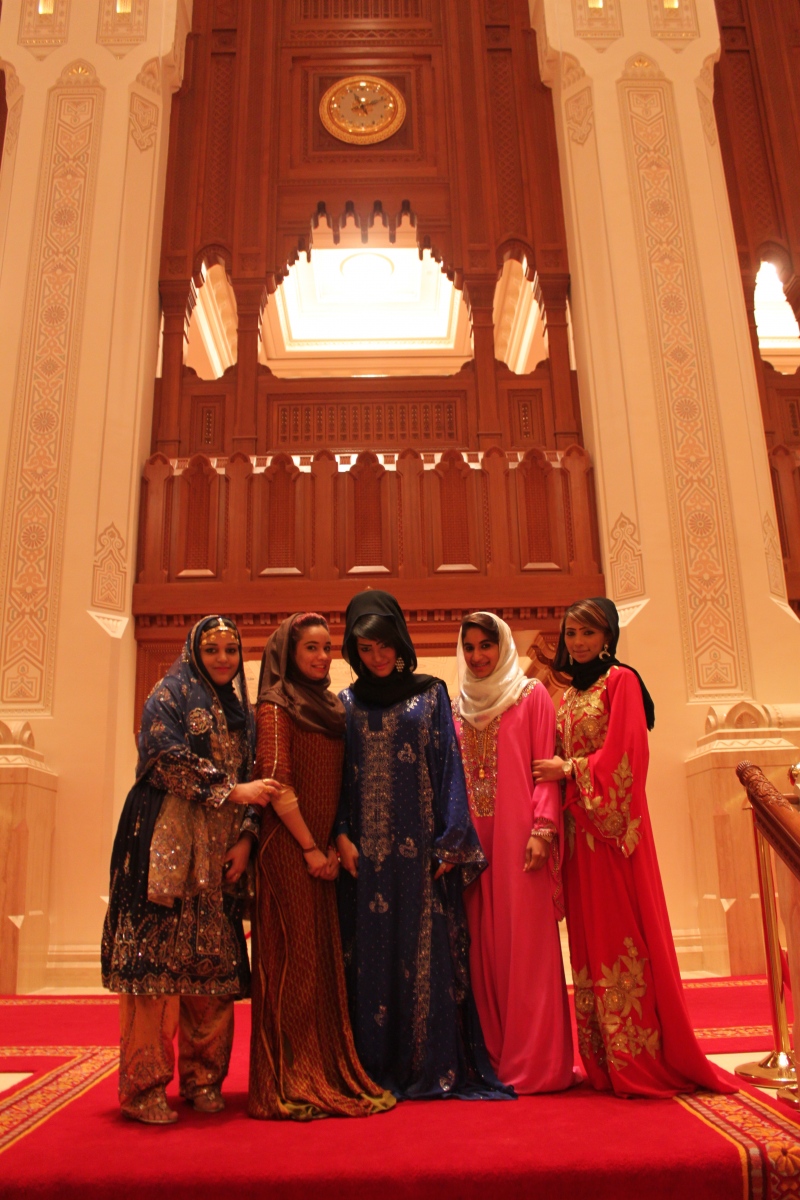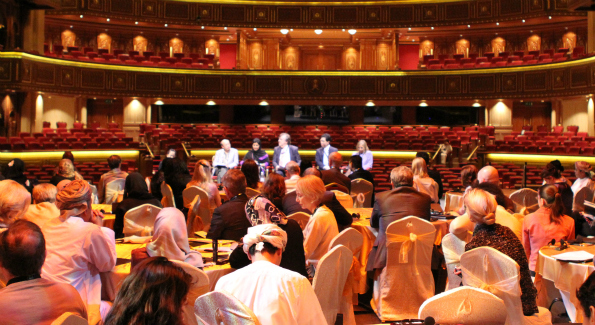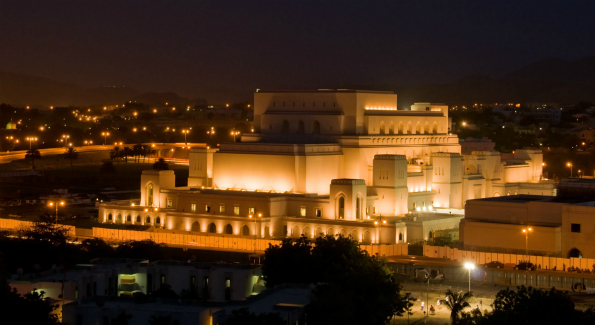Small but prosperous Persian Gulf state takes international stage with opening of magnificent new opera house and global initiative partnership with the Aspen Institute.
By Kevin Chaffee

Royal Opera House Muscat Ushers. (Photo by Andrew Brown from his blog "Andy in Oman" www.andyinoman.wordpress.com)
Like other Mid-eastern heads of state, Sultan Qaboos bin Said faced chaos and unrest fomented by the “Arab Spring” in Oman, the oil rich, strategically located Persian Gulf nation he has ruled since 1970. After labor strikes and demonstrations that began in March, the Sultan replaced much of the aging Omani Cabinet – previously thought to be untouchable – in a country where 70 percent of the population is under the age of 20. Creation of 50,000 new jobs was soon decreed along with an increase in the minimum wage by one-third. Constitutional changes were announced and the bicameral parliament was granted legislative and regulatory powers.
After things quieted down, time was ripe for world attention to focus on a milestone of an entirely different nature, part of a long-term strategy to foster increased cultural ties between the sunny sultanate and the community of nations.
After a decade of planning and construction, the Royal Opera House Muscat, in the nation’s capital, opened on Oct. 12 with a lavish production of “Turandot” directed by Placido Domingo and followed by an inaugural season featuring performances by Renee Fleming, Andrea Bocelli, Wynton Marsalis and the American Ballet Theatre. The gathering there from Nov. 28-30 of more than 100 prominent arts and culture figures from 30 nations for the Aspen Institute’s “Arts in Motion” Global Initiative on Culture and Society didn’t get as much publicity as the 269,000-square foot marble opera house decorated with gold and handmade ornaments, but it helped put Oman “on the map” just the same. Organizers were optimistic that the biennial “summit” (with shifting international locations in even-numbered years) may well become a cultural version of the annual World Economic Forum in Davos, Switzerland.
[youtube]http://www.youtube.com/watch?v=9e2rcqtBK34[/youtube]
Created in 2007 to “build a neutral platform” for networking, policy formulation and resource development in the fields of media, arts, humanities, heritage and socio-economics, the initiative uses high-profile discussion panels and leadership seminars to promote network building and arts and culture planning across national boundaries.
“We hope to find common ground for improvement of relations among nations in the belief that arts and culture bring about something that is enormously important to bring us all together,” AI Executive Vice President Elliott Gerson told inaugural session participants seated on the opera house stage. “It is the essence of what it is to be human.”
Damien M. Pwono, the Global Initiative’s executive director, outlined ways the gathering might foster increased international ties using music, fashion, dance and literature to promote dialogue on culture and society as well as world peace and economic development. Our hope, he noted, is that we “will conclude by mapping out an agenda for the future.”
The twelve seminars over three days featured a wide range of topics ranging from education, youth empowerment, technology the entertainment industry and art criticism to the differences between raising “old and new money” and the role of fashion in the expression of artistic freedom. Debate and discussion was especially lively at times since the astonishing diversity of the participants added great color to gatherings that sometimes resembled a mini-U.N. General Assembly. A Saudi princess with a fashion business in Riyadh, for example, might be heard complaining to an American rap artist that her work is viewed as a hobby instead of a real profession in the Arab world as a dance company director from Beirut queried a Japanese high tech entrepreneur about sources of arts funding.
The effects of the economic recession were of major concern throughout the proceedings although there were a few surprising glimmers of hope. One speaker noted that Singapore and South Korea have greatly increased arts funding in recent years while others assumed a bright future for the global cultural economy if proper infrastructure and creative economy are in place. Kathy Barbash, the Philadelphia Orchestra’s director of China Initiatives, told session colleagues that Bollywood productions now generate $1.8 billion per year in the U.S. market alone. Hans d’Orville, UNESCO’s assistant director of strategic planning, predicted that the forty percent of world travel that is now connected to tourism will continue to expand.
Other speakers predicted that the real reason the “creative economy” will continue to grow despite the downturn is because it is now fully part of the contemporary world and therefore resilient – with television, videos, social media and escapism having the power to transform new ideas into investments having both cultural and economic value. “Creative people are human capital,” UNCTAD economist Edna dos Santos-Duisenberg said. “They are key to enhancing economic capital.”
In a session on “Mainstreaming Culture and Development, Amir Dossal, founder and chairman of the Global Partnership Forum and the manager of Ted Turner’s $1 billion gift to the United Nations, stressed that digital media should be the “core element of our work” and that donors needed to “rethink giving” by redirecting funds to connect schoolchildren across borders – especially where conflict resolution is key (as with Israel and Palestine).
Political concerns voiced by participants from Arab countries sometimes focused on striking a balance between the old and the new. Numerous speakers emphasized that the fostering of critical thinking, entrepreneurship and creativity did not have to be at odds with the preservation of tradition.
“Should we welcome Western expertise or think twice?” Omani Cultural Affairs Adviser Abdkareem Al-Lawati asked those attending a session on “Change and Resistance.” There are no “magical solutions in situations where some welcome positive influences but others fear cultural domination,” he said before proposing a “global protocol to preserve local cultures in the face of globalization.”
Several Arab speakers warned against “clichéd framings” of the region by Western media that constantly focus on provocative differentiations of good vs. bad Islam, the “fascination with the veil,” gender inequality, etc. It would be better, they suggested, if the focus turned to such topics as the legitimate discussion of feminism within Muslim culture.
Raina Kumra, a State Department official turned holistic brander, surprised another audience with the revelation that only one percent of the content of the worldwide web is in Arabic, suggesting that the ever-burgeoning growth of the Internet is still a phenomenon based largely in the English-speaking world.

Guests gather for the Plenary Session of the Aspen Institute’s Global Initiative on Culture and Society on the massive opera house stage. (Photo by Mandela Gregoire)
In another session, Omani participants welcomed opportunities for cross-cultural dialogue with colleagues from other countries while questioning their government’s focus on Western-oriented programming at the new opera house. Responding to criticism that local musicians were passed over in favor of international stars for the inaugural season, Royal Opera House program director Issam El-Mallah insisted that the opening had to feature well-reviewed artists for the opera house to gain initial respect and credibility at a world level and to “educate our people so they get to know and understand international culture and the arts.” Balance, he noted, was a “key element” in planning what would be presented and was part of an overall strategy to keep the doors open for performers “from every side of society.”
“We have to educate people in everything and need to introduce them at a very young age to new things as well as our own folkloric groups and symphony” said Hunaina Al-Mughairy, Oman’s ambassador to the U.S. “They can’t just be learning mathematics.
“We’ll do it slowly,” she said, “and we’ll do it right.”
The Aspen Institute Global Initiative on Culture and Society will convene the fifth annual Cultural Diplomacy Forum in Tokyo from October 22 to 24, 2012, with the theme of “The Art of Peace-Building and Reconciliation” in collaboration with the International Christian University and Japan International Christian University Foundation. In 2013, the forum will return to Muscat, Oman.
Kevin Chaffee is Senior Editor of Washington Life magazine.

